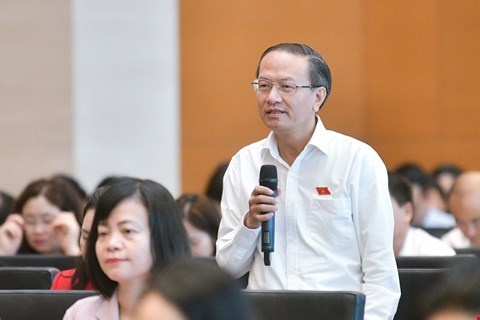Lawmakers discuss anti-monopoly aspects of Electricity Law
 |
During the NA's specialised session on August 29, NA deputy Dinh Ngoc Minh, a standing member of the Economic Committee, raised critical questions about the reduction of monopoly practices in the draft law on electricity amendments.
Minh asked, "Will the amendments to the Electricity Law effectively address monopolies? How far will the state retain its monopoly, and how will investment be opened up to other economic sectors?"
The draft law seeks to eliminate monopolies, remove unreasonable barriers, and maximise the socialisation of investment and utilisation within the national power transmission infrastructure while ensuring national defence and security.
It encourages participation from all economic sectors in power generation, grid construction, electricity distribution, and retail. Private entities are allowed to operate grids they have invested in, in accordance with legal regulations.
Article 5 of the draft law outlines that the state will maintain a monopoly in specific key areas, including the national power system’s operation, investment in nuclear power plants, multipurpose strategic hydropower projects, emergency power sources, and critical transmission grids of 220kV and above.
These projects, once completed, will be operated by the state. The prime minister will determine the list of strategic hydropower projects and assign state-owned enterprises or wholly state-owned subsidiaries to develop and manage these projects.
Minh pointed to the telecommunications industry as a successful example of dismantling monopolies, remarking, "Decades ago, making a phone call was expensive and consumed a significant portion of a monthly salary. Today, telecommunications are both affordable and efficient."
He further questioned the draft law's clarity on the extent of the state’s monopoly in power transmission.
"When will the monopoly end? When will the public face fewer restrictions and gain more market access, with full transparency?" Minh asked.
The Standing Committee on Science, Technology, and Environment recommended a thorough review and clarification of the policies outlined in Article 5 to ensure feasibility and facilitate investor engagement while enhancing state management.
Specifically, the committee proposed that the state should not monopolise the entire transmission sector but should focus on high-voltage and ultra-high-voltage transmission (above 35kV).
Deputy Minister of Industry and Trade Truong Thanh Hoai clarified that the state’s monopoly would primarily cover the regulation of the power system and investment in crucial, multipurpose projects necessary for the stable operation of the national grid, such as the Hoa Binh, Son La, and Lai Chau hydropower plants.
Regarding power transmission, Hoai explained that the state would retain a monopoly on high-voltage and ultra-high-voltage grids, while other transmission lines would be open to socialisation. This approach aligns with the national energy security objectives set out in Resolution 55 of the Politburo, maintaining state control over critical infrastructure while allowing socialisation in other areas.
"We aim to reduce monopolies as much as possible while ensuring safety and energy security, in line with the directives of the Party and the state," Hoai stated.
The drafting committee added that currently, Vietnam Electricity (EVN) only accounts for 38 per cent of the national grid's total capacity. Vietnam is gradually developing competitive electricity markets to ensure transparency.
Since early August, National Power System Dispatch Centre has been transferred from EVN to the Ministry of Industry and Trade. Consequently, EVN and other corporations now participate in the market as standard entities.
However, the Standing Committee on Science, Technology, and Environment advised reconsidering the provision that grants the state a monopoly on multipurpose hydropower projects and emergency power grids, arguing that the scope is too broad and could restrict opportunities to attract social investment in power development.
The government proposed that the revised Electricity Law be considered and passed by the NA in a single session (the eighth session of the 15th NA in October). However, the Standing Committee and some NA committees believe that passing the law in one session may be too hasty, given the comprehensive scope of the amendments, which include six major policy groups with direct and widespread impact on electricity supply, production, and pricing.
To ensure the law's quality and practicality, it is suggested that the NA consider the law over two sessions, with an initial review in October 2024 and final approval in May 2025.
This would allow sufficient time for research, discussion, stakeholder input, and revisions. If the government prepares the draft well and consensus is reached during discussions, the Standing Committee may recommend passing the law in a single session.
 | Supportive policies crucial for retail plastic reduction While major retailers are spearheading plastic reduction efforts, a joint initiative with government and environmental groups is needed to align business interests with sustainability goals. |
What the stars mean:
★ Poor ★ ★ Promising ★★★ Good ★★★★ Very good ★★★★★ Exceptional
 Tag:
Tag:
Related Contents
Latest News
More News
- Masan Consumer names new deputy CEO to drive foods and beverages growth (February 23, 2026 | 20:52)
- Myriad risks ahead, but ones Vietnam can confront (February 20, 2026 | 15:02)
- Vietnam making the leap into AI and semiconductors (February 20, 2026 | 09:37)
- Funding must be activated for semiconductor success (February 20, 2026 | 09:20)
- Resilience as new benchmark for smarter infrastructure (February 19, 2026 | 20:35)
- A golden time to shine within ASEAN (February 19, 2026 | 20:22)
- Vietnam’s pivotal year for advancing sustainability (February 19, 2026 | 08:44)
- Strengthening the core role of industry and trade (February 19, 2026 | 08:35)
- Future orientations for healthcare improvements (February 19, 2026 | 08:29)
- Infrastructure orientations suitable for a new chapter (February 19, 2026 | 08:15)





















 Mobile Version
Mobile Version